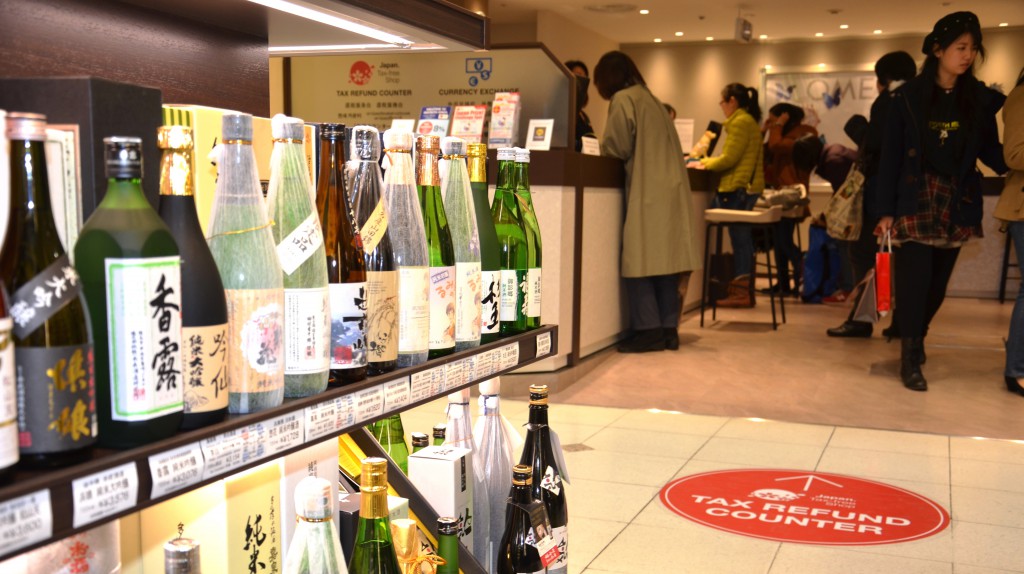
Bottles of sake, which is popular among foreign tourists, are displayed at Matsuya Ginza department store, with a tax refund counter in the back.
Yuji Hosoda
Department stores and major retailers are strengthening duty-free counter services, as certain items originally subject to 8 percent consumption tax, such as food and beverages, became tax-free for foreign visitors in October on condition that they are purchased at designated retailers and are not consumed while in Japan.
As the number of foreign tourists and the amount of money they spend on shopping are increasing every year, retailers and farmers in regional areas are also gearing up efforts to sell their local specialties to foreign visitors.
At Matsuya Ginza, a major department store in Tokyo’s Chuo Ward which is popular among foreign shoppers, sales of duty-free items in October and November roughly doubled compared with the same period last year, amounting to 10 percent of total sales. Sake sales achieved a remarkably high growth, rising 2.5 times from a year before.
In the end of September, Matsuya Ginza moved its tax refund counter to the food section from a different floor, thinking that foreign tourists would buy more food products after they become tax-free in October. The store also increased the number of staff at the counter to offer the 8 percent tax refund.
Right in front of the counter stands what Matsuya Ginza claims one of the largest sake sections in Ginza. The section was expanded in April to sell 450 labels of sake, letting shoppers try tasting them with charges. Sake is sold mainly in 720 ml bottles, so that it will be easier for travelers to carry.
Cards written in English are placed on the shelves to explain the taste and flavor of each label, as the store staff believes it is necessary to describe in detail the characteristics and background of the products to boost sales.
Matsuya Ginza spokesman said in order to attract more foreign shoppers to the food section, the firm will produce fliers to help store staff explain the selling points of Japanese-made products. Producers should also create a sales strategy taking foreign tourists into account, the spokesman said.
Similar efforts are expanding among retailers other than department stores. Starting this month, convenience store chain Seven-Eleven Japan Co. began offering duty-free services in two stores in Tokyo and Kyoto where many foreign tourists visit. Seven-Eleven is the first convenience store chain to offer the service, according to the firm. Meanwhile, supermarket chain Aeon Co. doubled the number of stores designated for duty-free shopping to 100 by October.
Farmers’ stores gear up to attract foreign tourists
Duty-free shops are set up in regional areas to sell farm produce and processed agricultural items.
In Wakayama Prefecture, the number of duty-free shops increased from 7 in April to 66 in October, marking the second largest rise among prefectures nationwide.
Wakayama’s case is rare in that not only major retailers but also agri-tourism farms, agricultural processing firms and farmers’ stores have applied to obtain a license to open duty-free shops, in response to prefectural government officials’ efforts to visit each firm and explain the merits of getting the license.
Kuroshio Ichiba Co., which sells seafood and other products inside Wakayama Marina City amusement park, obtained the license in October. The shop is filled with tourists who visit the park directly from the Kansai International Airport in sightseeing buses. They purchase mainly seafood, but processed foods such as ume (Japanese apricot) liquor and ume juice are also popular.
The prefectural government officials say they are focusing especially on tourists from Hong Kong. A total of 62,000 people from Hong Kong visited the prefecture in fiscal 2013, up 80 percent from the previous year, marking the highest rise among foreign tourists.
They say it is beneficial to focus on Hong Kong to encourage sales of farm produce also because while many countries prohibit travelers from bringing in fresh fruits from foreign countries for quarantine reasons, Hong Kong allows them to bring in tangerines and persimmons, the specialties of Wakayama. Although the fruits have not been sold much to Hong Kong tourists so far, the officials say they see them as a potential customer base.
Small-size retailers face difficulties in offering duty-free services, such as obtaining personnel fluent in foreign languages and changing the cash register system in accordance with the service. Wakayama prefectural government is planning to hold a seminar to cope with the issues, considering that the number of foreign tourists will show a stable growth in the future.
(Dec. 22, 2014)

